Tag: university history
“I take this obligation freely:” Recalling UC Berkeley’s loyalty oath controversy
By Shannon White, with research by Adam Hagen
Loyalty oaths have long been in use in the United States as a means of promoting social unity in the face of war, perceived security threats, or fears about waning political support. Even now, loyalty oaths are common as a condition of employment for many state workers. In fact, all employees of the state of California, including the faculty and staff members of the University of California, currently sign an oath of loyalty upon hire, stating that they will defend the constitution against all enemies foreign and domestic, and that they take this obligation freely.
In particular, the idea of a governmental loyalty oath rose to prominence in the 1940s, when tensions between the US and the Soviet Union and growing fears about a communist infiltration of the government prompted President Harry S. Truman to establish a loyalty program for federal employees. In March 1947, Truman signed Executive Order 9835, which ensured that employees of the US government could be subject to investigation for potential involvement in “subversive” organizations.
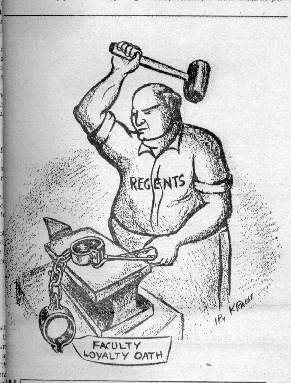 In the wake of President Truman’s Executive Order, the California state legislature began to introduce its own policies in opposition to potential communist activity in the government. These proposals would have given the state authority over the University of California in matters of loyalty, prompting the University of California administration to act in response to prevent infringement on the institution’s autonomy. Furthermore, the university was at this time also facing financial difficulties, with the state threatening to withhold funding for the university budget due to worries about subversive activity within its community. As a result of these mounting pressures, University President Robert G. Sproul proposed his own loyalty oath for university faculty and employees on March 25, 1949. The text of the oath approved by the Regents on June 24 was as follows:
In the wake of President Truman’s Executive Order, the California state legislature began to introduce its own policies in opposition to potential communist activity in the government. These proposals would have given the state authority over the University of California in matters of loyalty, prompting the University of California administration to act in response to prevent infringement on the institution’s autonomy. Furthermore, the university was at this time also facing financial difficulties, with the state threatening to withhold funding for the university budget due to worries about subversive activity within its community. As a result of these mounting pressures, University President Robert G. Sproul proposed his own loyalty oath for university faculty and employees on March 25, 1949. The text of the oath approved by the Regents on June 24 was as follows:
I do solemnly swear (or affirm) that I will support the Constitution of the United States and the Constitution of the State of California, and that I will faithfully discharge the duties of my office according to the best of my ability; that I do not believe in, and I am not a member of, nor do I support any party or organization that believes in, advocates, or teaches the overthrow of the United States Government, by force or by any illegal or unconstitutional means, that I am not a member of the Communist Party or under any oath or a party to any agreement or under any commitment that is in conflict with my obligations under this oath.
Almost immediately, the introduction of the loyalty oath garnered controversy. Many faculty members and staff refused to sign the oath, resulting in a rash of firings and resignations and a tense stand-off between the Board of Regents and university faculty, staff, and students. The oath was later declared unconstitutional in 1951 in Tolman v. Underhill, and many of the thirty-one dismissed faculty returned to Berkeley.
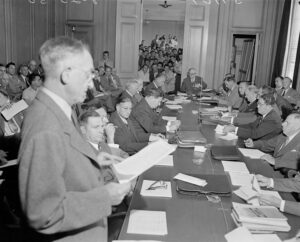
1950 August 25, BANC PIC 1959.010. San Francisco News-Call Bulletin Newspaper Photograph Archive, The Bancroft Library, UC Berkeley.
The UC Berkeley Oral History Center has several interviews related to the loyalty oath controversy, many from UC faculty members who witnessed or were themselves involved in the response to the oath’s introduction.
Among these is a collection of interviews specifically concerning the loyalty oath, which features oral histories from Howard Bern, a UC Berkeley faculty member who signed the oath last-minute; Ralph Giesey, a graduate student of non-signer Ernst Kantorowicz; and Deborah Tolman Whitney and Mary Tolman Kent, the children of Berkeley professor Edward Tolman, a key leader of the faculty opposition to the oath.
These interviews reveal the fraught relationship between university faculty and administration after the instatement of the loyalty oath, with rampant fears about academic freedom and discrimination against potentially “subversive” faculty members. Here, Howard Bern shares his distaste of the oath and his moral grounds for originally refusing to sign:
I felt that it was discriminatory, that it was singling out university professors as if they were especially potentially evil. So on a civil libertarian ground I objected to this. And the second ground was my own feeling. I had been in the army for almost four years. What more manifestation of loyalty did they really want?
In the oral history of Charles Muscatine, who returned to UC Berkeley in 1953 after being fired for his refusal to sign the oath as an assistant professor, Muscatine recalls the most poignant moment for him of the entire controversy:
At a certain moment, [Malcolm Davisson, a faculty policy chair] contacted me. He said, “We have lost the moral right to decide.”
Other interviews offer more insight into the experience of witnessing the loyalty oath controversy firsthand. For instance, Ralph Giesey discusses the hearings he and his fellow non-signing teaching assistants had to undergo as a condition of their opposition to the oath. Howard Schachman, an assistant professor at UC Berkeley at the time of the oath, describes the moral compromise he underwent when he signed something he considered philosophically “abhorrent.”
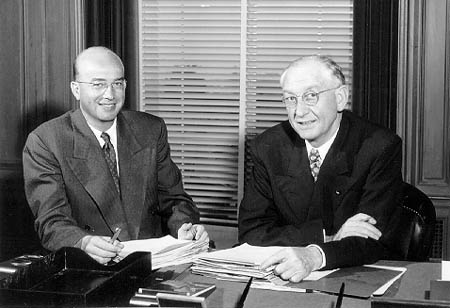
The loyalty oath controversy at UC Berkeley is often viewed through the perspective of academic freedom amid anticommunist fervor, but an oral history of Clark Kerr, UC Berkeley faculty member at the time — and later campus chancellor and university president — provides another perspective. Kerr observed that the controversy must be viewed in light of the internal divisions in the Board of Regents that escalated in the 1940s over debates about centralization versus campus autonomy. According to Kerr, Regent John Francis Neylan and the southern regents tended to favor campus autonomy, while University President Robert G. Sproul and most of the northern regents called for a centralized system. This issue resolved itself with the creation of the post of chancellor for each UC campus, and Kerr himself was later appointed to the position at UC Berkeley in 1952.
According to Kerr:
As I understand it, Neylan really just seized on the oath controversy as a way of whipping Sproul around because he was unhappy with him on other grounds. . . . [Sproul] looked to me like a man who was just immobilized by the controversy. It was out of this, according to what I observed, that [Earl] Warren then came to take a position of leadership, which he had not taken in the regents before. Normally governors don’t. But the controversy was tearing the university apart. The president was immobilized. Warren stepped in, then, essentially against the oath, or at least against the firing of the non-signers, and took leadership of the more liberal elements of the board.
Howard Bern also recognizes Robert Sproul’s role in mishandling the loyalty oath controversy, stating, “Just as, although he would not admit it, the Free Speech Movement really broke Clark Kerr, I think the loyalty oath situation just destroyed Robert Gordon Sproul and his influence. I don’t think he was a bad man, a bad leader, but I think he made a very fatal error.”
All in all, these oral histories concerning the UC loyalty oath controversy are a great resource for understanding the climate at the University of California in the 1940s and ’50s. They offer a wealth of insight concerning the faculty experience at UC Berkeley, and since many of the interviewees went on to become involved with the Free Speech Movement and other political causes, there is a particular focus in these oral histories on the growth of social movements at the university. For more information about the loyalty oath controversy, check out the Oral History Center’s collection of interviews concerning the oath and other related resources from The Bancroft Library.
Shannon White is currently a third-year student at UC Berkeley studying Ancient Greek and Latin. They are an undergraduate research apprentice in the Nemea Center under Professor Kim Shelton and a member of the editing staff for the Berkeley Undergraduate Journal of Classics. Shannon works as a student editor for the Oral History Center.
Adam Hagen is currently a third-year history student with a concentration in modern European history. Adam works as a student editor for the Oral History Center. He is also a member of the editing staff of Clio’s Scroll, the Berkeley Undergraduate History Journal.
Related Resources from the OHC and The Bancroft Library
Oral Histories Cited
Clark Kerr, University of California Crises: Loyalty Oath and the Free Speech Movement.
The Loyalty Oath at the University of California, 1949–1952. Interviews with Howard Bern, Ralph Giesey, Mary Tolman Kent, Deborah Tolman Whitney.
Howard Schachman: UC Berkeley Professor of Molecular Biology: On the Loyalty Oath Controversy, The Free Speech Movement, and Freedom in Scientific Research.
Charles Muscatine: The Loyalty Oath, The Free Speech Movement, and Education Reforms at the University of California, Berkeley.
Related Oral History Projects
The SLATE Oral History Project documents the UC Berkeley campus political organization SLATE — so named because the group backed a slate of candidates who ran on a common platform for ASUC (Associated Students of the University of California) elections from 1958 to 1966. SLATE ignited a passion for politics in the face of looming McCarthyism and what many perceived as the University of California’s encroachment on student rights to free speech. See also, “They Got Woken Up”: SLATE and Women’s Activism at UC Berkeley
The Free Speech Movement Oral History Project documents the movement at UC Berkeley that began in the fall of 1964 from the perspective of the ordinary people who made it possible — and those who opposed it — including students, lawyers, faculty, and staff.
Related Resources from The Bancroft Library
Kantorowicz, Ernst H. The fundamental issue : documents and marginal notes on the University of California loyalty oath. Bancroft F870.E3 K18.
Papers pertaining to California loyalty oaths, 1954. Bancroft BANC MSS C-Z 92.
University of California, Berkeley Accounting Office loyalty oath records, 1949–1964. UC Archives CU-3.11.
About the Oral History Center
The Oral History Center of The Bancroft Library has interviews on just about every topic imaginable. You can find the interviews mentioned here and all our oral histories from the search feature on our home page. Search by name, keyword, and several other criteria. We preserve voices of people from all walks of life, with varying political perspectives, national origins, and ethnic backgrounds. We are committed to open access and our oral histories and interpretive materials are available online at no cost to scholars and the public.
Lucy Sprague Mitchell: Child Education Reformer and Berkeley’s First Dean of Women
By Deborah Qu
“It was naive, but it wasn’t as naive as it sounds.” — Lucy Sprague Mitchell on chasing her dream to expand career prospects for women
One hundred and fifty years ago in 1870, the UC Regents first declared that the university’s doors were open to women students, giving them the opportunity to pursue a higher education. Access to student facilities, housing, and resources were still far from equal for women. Thus began an era where thousands of young women pioneered for positive change, making their mark on the university, as well as transforming society at large. One of these women was Lucy Sprague Mitchell, the first dean of women from 1906–1912, and one of the first women instructors in UC Berkeley’s Department of English. Mitchell, an advocate for educational reform, had observed that “public opinion reacts very slowly. And there’s always been something that irritates me, and that is the voices against are so much louder than the voices for.” Yet her unrelenting optimism and her passion for education allowed her to introduce a more holistic framework for child learning and expand career prospects for women outside the limited field of teaching.

Born in 1878, Lucy Sprague Mitchell grew up in a traditional household where any sort of play was seen as “a waste of time.” In a 1962 interview with the Oral History Center of The Bancroft Library, Mitchell recalls a multitude of happy childhood memories, but they were also mixed with conflicting feelings of unworthiness and loneliness caused by her family’s strict Puritan modes of discipline. It is possible that these childhood learning experiences were great influencers in her later experimental work in education. In her autobiography, Two Lives: The Story of Wesley Clair Mitchell and Myself, she explained how she believed that the entire learning process is not complete without the “intake” of experience transforming into an “outgo,” or some living, creative action caused from the development. Perhaps these mixed childhood memories had also inspired her to take positive action through childhood education reform.
After graduating from Radcliffe College, Lucy Sprague Mitchell was appointed as Berkeley’s first dean of women at only age 23. In her oral history, Mitchell recalled a conversation she had with the university President Benjamin Ide Wheeler. His instructions were “to find out what needs to be done and to do it.” While terrified and confused, this is exactly what Mitchell did. As dean of women, Mitchell did not succumb to the “motherly” role to students that was expected of her in the early 1900s. Instead her youthful perspective allowed her to expand beyond the traditional housing and counseling needs to truly connect with students at Cal. She initiated community trips, poetry readings, and sex education discussions. She organized Parthenia, which she fondly called greek for “women of the Parthenon,” a performative showcase about various historical women and imagined female characters.
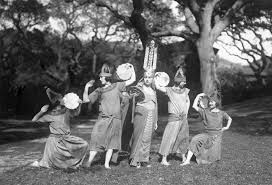
In her oral history, Mitchell reflected on why she wanted to leave her role as dean of women; Mitchell explained that her interests truly were rooted in education, not administration. During her years working with women students, she had become, she says, “extremely concerned about the lack of professional training for women excepting in the field of teaching. She explained how “not everybody is equipped to be a teacher, nor wants to be a teacher.” At the time, Mitchell found it jarring that over 90 percent of the women students she surveyed had planned to become a teacher after graduation. While Cal was progressive for its time, teaching was the most socially acceptable profession and “the only thing that the University offered to women.” In retrospect, Lucy Sprague Mitchell believed that her real reason for requesting a leave from Berkeley “was to try to explore different fields of work that women could enter and for which the University could train them.”
This disaffection inspired innovation. Lucy Sprague Mitchell brought the issue of limited education for women to six social organizations in New York, completing statistical fieldwork from women working in nursing, to labor legislation about city tenements, to public schools. Her exposure to public school education had such a profound effect on Mitchell that she became an educator resource for teachers throughout 1922–1955. She began developing experimental methods about childhood education and classroom procedure that promoted creative expression and holistically fulfilled a child’s emotional, physical, and mental needs. Her emphasis on “relationship teaching” and “active learning” over memorization helped shape the way for “social studies,” a course widely studied in American classrooms today. Her focus on the learning environment was unorthodox at the time, and it led her to new paradigms of using childhood maturity instead of age to measure emotional intellectual development. She founded Bank Street College of Education in New York as a graduate student teacher training institution in 1916 based on this same philosophy.
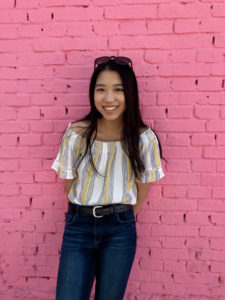
From my perspective as an undergraduate student at Cal, Lucy Sprague Mitchell’s life story teaches me that to truly orchestrate change, we should not just be focusing on the various problems of the present, but rather dreaming about all the future potential. The oral history interview allowed Lucy Sprague Mitchell to recount the early dream she had formed working with Cal students in her late 20s: to provide opportunities for young women to pursue rich and nuanced fields of study. This dream certainly did not go to waste. As a young college woman with a wide selection of majors to choose from, I am grateful that she and many others helped pave the way. Reflecting on this vision for women, Lucy Sprague Mitchell said, “Now that sounds very naive. It was naive, but it wasn’t as naive as it sounds.”
Deborah Qu is a first year undergraduate student who intends to study psychology. As a part of the celebration of 150 years of women at Berkeley, Deborah is researching the Oral History Center’s vast archive to identify women in the collection with a relationship to UC Berkeley.
Find this and all our oral histories from the search feature on our home page. You can search by name, key word, and several other criteria.
Exhibit: Whose University? The 50th Anniversary of the UC Berkeley Third World Liberation Front Strike
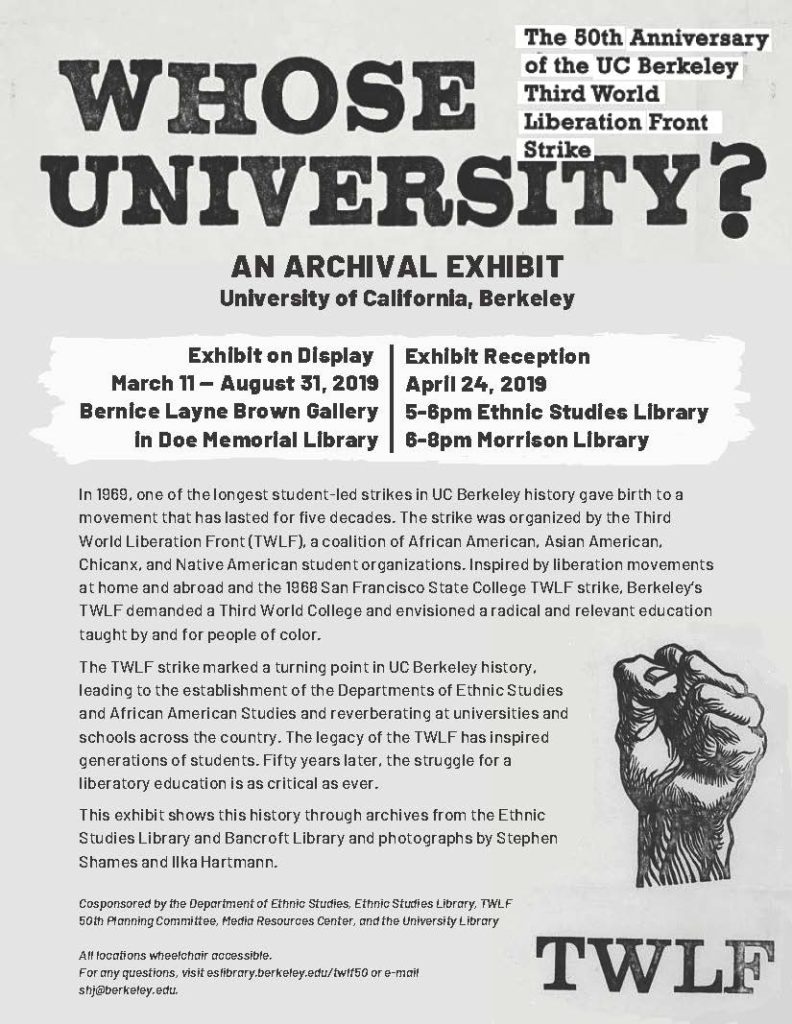
Professor Susan Ervin-Tripp: 2016 Class of ’31 Interviewee in University History
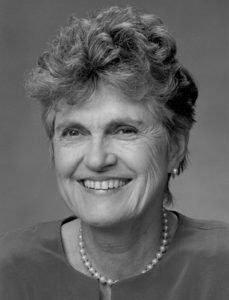
One of the great joys of being an oral historian is getting to talk to people you otherwise wouldn’t have known. We have the privilege of asking people about their lives, putting their experiences in context of the larger historical landscape, posing questions that others don’t have the opportunity to ask. I had the opportunity to do just this when I interviewed Professor Susan Ervin-Tripp in 2016.
Professor Dan Slobin puts it best in the introduction he wrote for Ervin-Tripp’s oral history:
Throughout her long and productive career, Susan Ervin-Tripp has repeatedly been a path-breaker. And the paths that she helped explore have become well-traveled roads. I is remarkable to see so many innovations in one life story: psycholinguistics and sociolinguistics, embracing new directions in the study of first-language acquisition as well as bilingualism; repeated applications of new technology: computers, tape recorders, video recorders, wireless microphones; design of new methods of transcribing and documenting the many layers of speech interaction; cross-linguistic and cross-cultural research, with attention to both individual and interpersonal dimensions of language. Along with these contributions to the scientific side of her profession, Ervin-Tripp has given equal attention to the institutional and political dimensions of academia, focusing on the treatment of women and minorities. Wherever possible, she used her academic skills as a psycho- and sociolinguist to provide a scientific foundation to her advocacy.
Slobin is not the only one who values Ervin-Tripp’s many contributions. Her interview was part of our Class of ’31 series, in which faculty and staff, both current and retired, are nominated by admirers to the subject an oral history. Ervin-Tripp received numerous, passionate nominations which conveyed a resounding eagerness to document her work in academics and equity, knowing that we could all benefit from learning about her trailblazing work.
I sat down with Ervin-Tripp for our first interview in May of 2016. It was immediately clear that she was a practiced speaker, having taught for many years, with a healthy sense of humor. She was poised and articulate, prepared with her notes. Over the course of our six hours of interviews, we discussed her childhood during the Great Depression in Minneapolis, Minnesota, her undergraduate education at Vassar College, her doctoral work at the University of Michigan, and her career at UC Berkeley, which began in 1958. She detailed her work on the Southwest Project in Comparative Psycholinguistics studying the connection between language and cognitive performance, her time as a professor in the Psychology and Speech Departments at Berkeley, her early adoption of technology in her research, her participation at Stanford University’s Center for Advanced Studies in the Behavioral Sciences and with the 1985 Scientific Exchange program in France. She talked about the significant advances that she made for women’s equality on campus and the multiple efforts she made to create such change.
It was a pleasure to have interviewed a woman whose career has impacted Berkeley so greatly. There are many lessons to learn from this interview, particularly the courage and persistence it takes to create an equitable environment. Professor Susan Ervin-Tripp’s oral history is one that is rare for her generation and one that should be celebrated.
Shanna Farrell, Interviewer, Oral History Center